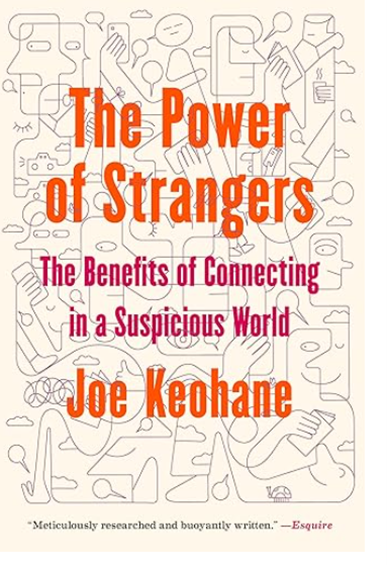By Jim Heffernan
This is a book I read a year ago, but I failed to review it. I should have written about it then because I thoroughly enjoyed the book and it changed me for the better. I guess I’m easily distracted.
It’s the sort of book that I would expect to be written by a psychologist or sociologist, but I think it’s a far better book because it’s written by a journalist.
A lot a research went into the book, covering subjects that range from anthropology, psychology, theology, history, politics, philosophy and beyond. The author never fails to make it all seem simple and understandable.
The book is divided into 3 parts (What Happens When We Talk to Strangers, Why Don’t We Talk To Strangers, and How To Talk To Strangers) and 21 chapters. I think each chapter would function as a stand-alone article, but the tapestry they make together is something to be savored.
Here are some excerpts from the book.
Page 32, “Why does the prospect of talking to strangers feel so unnatural, but when we do it, once we get past our initial anxiety, it feels like we’d been designed to act this way? The answer is, because we have been designed to act this way. A long process brought us here. We not only evolved to do this: We evolved because we did it.”
Page 65, But as you sit there across from these people, you start to care what they think or say. You can’t help it. They are right there, after all. You see their eyes, hear their voices, observe their body language, and quickly discover that these are not lesser minds. Their humanity is undeniable. And as they speak, and stubbornly refuse to conform to type, their complexity reveals itself. It’s a world apart from a lot of debate on Facebook or Twitter, where you can say whatever you want without ever having to register the look of pain or anger on the face of the person you’ve insulted, and they can do the same to you, and where likes and clicks and approval from your allies serve as incentives to reduce the complexity of others. Here, however, these are no avatars. And being in the physical company of these individuals both makes for a better conversation and keeps the conversation on the rails.”
Page 307, He closes the book with a George Bernard Shaw quote that I think explains everything about why we should talk to stangers: “Independence? That’s middle class blasphemy. We are all dependent on one another, every soul of us on earth.”
310 Pages Published July 13, 2021 Available at Cloud and Leaf Bookstore and Tillamook Public Library
As always, discussion welcome at codger817@gmail.com


